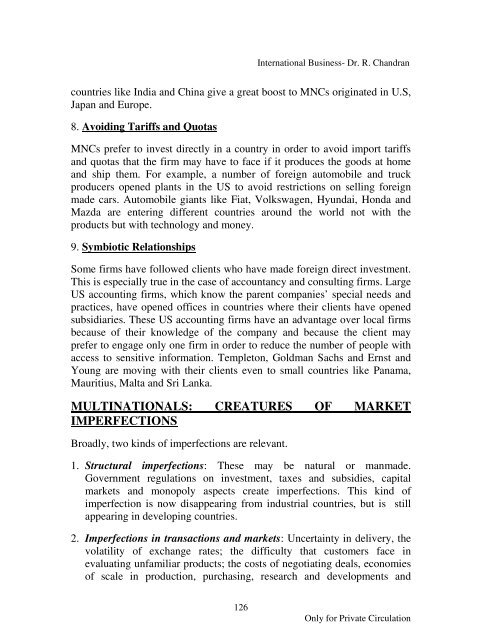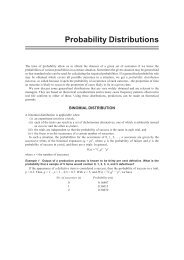International-Business-Dr-R-Chandran-E-book
International-Business-Dr-R-Chandran-E-book
International-Business-Dr-R-Chandran-E-book
You also want an ePaper? Increase the reach of your titles
YUMPU automatically turns print PDFs into web optimized ePapers that Google loves.
126<br />
<strong>International</strong> <strong>Business</strong>- <strong>Dr</strong>. R. <strong>Chandran</strong><br />
countries like India and China give a great boost to MNCs originated in U.S,<br />
Japan and Europe.<br />
8. Avoiding Tariffs and Quotas<br />
MNCs prefer to invest directly in a country in order to avoid import tariffs<br />
and quotas that the firm may have to face if it produces the goods at home<br />
and ship them. For example, a number of foreign automobile and truck<br />
producers opened plants in the US to avoid restrictions on selling foreign<br />
made cars. Automobile giants like Fiat, Volkswagen, Hyundai, Honda and<br />
Mazda are entering different countries around the world not with the<br />
products but with technology and money.<br />
9. Symbiotic Relationships<br />
Some firms have followed clients who have made foreign direct investment.<br />
This is especially true in the case of accountancy and consulting firms. Large<br />
US accounting firms, which know the parent companies’ special needs and<br />
practices, have opened offices in countries where their clients have opened<br />
subsidiaries. These US accounting firms have an advantage over local firms<br />
because of their knowledge of the company and because the client may<br />
prefer to engage only one firm in order to reduce the number of people with<br />
access to sensitive information. Templeton, Goldman Sachs and Ernst and<br />
Young are moving with their clients even to small countries like Panama,<br />
Mauritius, Malta and Sri Lanka.<br />
MULTINATIONALS: CREATURES OF MARKET<br />
IMPERFECTIONS<br />
Broadly, two kinds of imperfections are relevant.<br />
1. Structural imperfections: These may be natural or manmade.<br />
Government regulations on investment, taxes and subsidies, capital<br />
markets and monopoly aspects create imperfections. This kind of<br />
imperfection is now disappearing from industrial countries, but is still<br />
appearing in developing countries.<br />
2. Imperfections in transactions and markets: Uncertainty in delivery, the<br />
volatility of exchange rates; the difficulty that customers face in<br />
evaluating unfamiliar products; the costs of negotiating deals, economies<br />
of scale in production, purchasing, research and developments and<br />
Only for Private Circulation





